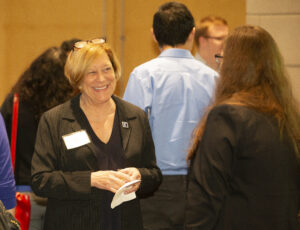Career Symposium Features the Significance of Mentorship and Networking
This article was originally published in Results & Discussion, Issue 8, Fall 2018.
By Jessamyn Perlmutter, Graduate Student
Each year, the BRET Office holds its Annual Career Symposium for hundreds of graduate students and postdoctoral fellows looking for advice on how to take the next steps in their careers. Held on June 1, this year’s event — “R3: Research and Research-Related Careers in Academia, Government, and Nonprofits” — featured a keynote address by Lynn Matrisian, Ph.D., former Chair of Cancer Biology at Vanderbilt University and current Chief Scientific Officer of the Pancreatic Cancer Action Network, along with small group sessions led by a team of ten alumni with expertise in teaching, research, and research-related roles.

Despite such a diverse set of topics, there were common threads across all of the panels. One recurring theme was the importance of mentorship. No matter the career path, all speakers spoke to the critical role of mentors in their own success. Mentors encouraged and supported the speakers in developing the skills they needed to succeed in their fields, and were essential to getting them ready to take the next steps in their careers. Whether they are faculty guiding you through the hiring process in academia or experienced investors helping you navigate governmental approval processes for your new product, mentors can make all the difference. They can be research advisors, colleagues, investors, career office personnel, departments specializing in an area of interest, alumni, or employers both on- and off-campus. The symposium speakers suggested reaching out and getting guidance from as many people as possible in the specific industry the attendees were interested in joining.
A related point that resurfaced many times was the importance of networking. Most speakers, if not all, highlighted how they leveraged their network to get the job they have today. While trainees may have the scientific expertise and the critical thinking skills necessary for a given job, it always helps to have an experienced person helping from the inside. For example, open positions may not be broadly advertised or perhaps they attract a lot of competition, but having a network of people who are aware of these jobs or who can help you stand out in the application pool can help you land a job you would not have gotten on your own. It can be very difficult to enter a field without an existing network, so the speakers advised trainees to begin building their networks now — both online and in person. While your research advisor can help you build technical and transferrable skills, your network can help you transition to a new job.
Finally, another shared aspect of all careers was the need to find funding for salaries, research, company expenses, educational materials, and other job-related costs. The support can come from government grants, independent contracts, donations, student tuition, or investors (depending on the field you are in), but regardless of its purpose or source, finding funding for people and projects is an unavoidable aspect of research and research-related positions.
Although the alumni represented a broad range of experiences and expertise, their input at this year’s symposium can be invaluable to anyone looking to build up their own career. So for all the current trainees reading this: the sooner you reach out to mentors and build a presence in your professional community, the better off you will be when it is time for you to apply for jobs.
Justine Sinnaeve (graduate student), Christopher Smith, Ph.D. (postdoctoral fellow), and Maria Agostini (graduate student) also contributed to this article.
Career Symposium Quick Takes
Advice for Teaching Careers
1. Get teaching experience early, since teaching takes practice.
2. Enhance your verbal and written communication skills.
3. Learn when to say no, as your time is a valuable asset.
4. Consider gaining extra experience as a postdoc.
5. Engage your network to get a position.
Advice for Government Careers
1. Expect a months-long timeline to get a position.
2. Tailor your application well to the job description.
3. Consider a fellowship or contractor job to get started.
4. Expect less flexibility in promotions and salary negotiation.
5. Talk to insiders; reach out to your network.
Advice for Research Careers
1. Experience diverse research topics and take note of other mentorship styles.
2. Learn business management skills to help you run a lab.
3. Be opportunistic; apply to many positions.
4. Learn about research and management from your mentors.
5. Network! It is critical.
Advice for Clinical Research Careers
1. Be willing to learn new skills from the ground up.
2. Work on your people skills; interactions are critical.
3. Start with entry-level positions or transitional fellowships.
4. Expect an experience that is not quite like bench research.
5. Develop teamwork skills; clinical research is not a solo job.
6. Leverage your network to find positions.
Advice for Entrepreneurs
1. Learn from as many mentors and advisors as you can.
2. Get experience making pitches and seeking investor funding.
3. Start as soon as you can; there is never a good time.
4. Develop teamwork and collaboration skills.
5. Build your network early; expand it beyond the university.